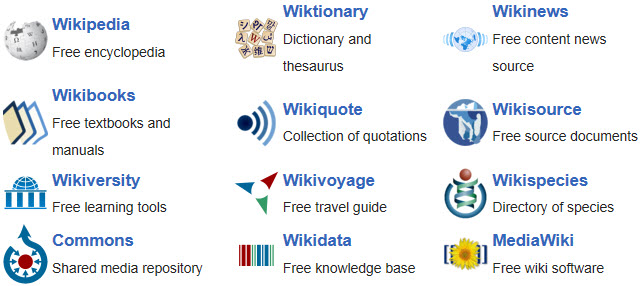This posting is a brief summary of the keynote address given by Dr Toni Sant (Wikimedia UK) at the 6th International Integrity and Plagiarism Conference held in Newcastle-upon-Tyne from 17 to 18 June 2014.
- Who has used Wikipedia?
- Who has edited Wikipedia?
- Who has written an article for Wikipedia? (Think about doing this, or setting an assignment for your students to do so – see more information below about developing an article for Wikipedia.)
The Wikimedia Foundation is the organisation that runs Wikipedia – it is donor funded, there is no advertising, it employs 150 people and operates in 286 languages. The project includes many specialist areas:
Five pillars of wikipedia
- It is an encyclopedia – has exactly the same scholarly authority as any other encyclopedia.
- Written from a ‘neutral point of view’ – should this rather be ALL points of view?
- Free content than anyone can edit/use/modify/share
- Editors should respect each other
- Does not have many firm rules, but there are some fundamental principles (enter the given shortcut in the Wikipedia search bar for more information):
- notability; conflict of interest; verifiability (WP:V); neutral point of view (WP:NPOV)
- plag (WP:Plag) – e.g. flag: ‘citation needed’; fair use (WP:NFC)
- civility (WP:Civil); consensus (WP:Con); assume good faith (WP:AGF)
How can we address concerns about the use or misuse of Wikipedia?
- Editing Wikipedia: every page has an edit button at the top – anyone can do it. Get your students to write a wikipedia article as part of their assignment – you can get help on the process of ‘Developing an article’
- Evaluating Wikipedia: there is a hierarchy of article types – you can start with a ‘stub’ if you have just the beginnings of an idea for an article (e.g. see ‘Fatberg’):

- Wikipedia education programme (available online to redistribute freely) – all about Wikipedia, plus a 12-week course on how to use Wikipedia as a teaching tool.
Dr Sant concluded by saying that Wikimedia and academia are natural allies – Wikipedia is often the starting point for essays, assignments or research, BUT it can lead students back to the primary sources (via the Reference list). Wikipedia provides a support mechanism – students can discover, understand (collaboration and crowd sourcing), comprehend, and learn to distinguish between diff types of sources (reliable, less reliable, unreliable) for use in their own writing.
